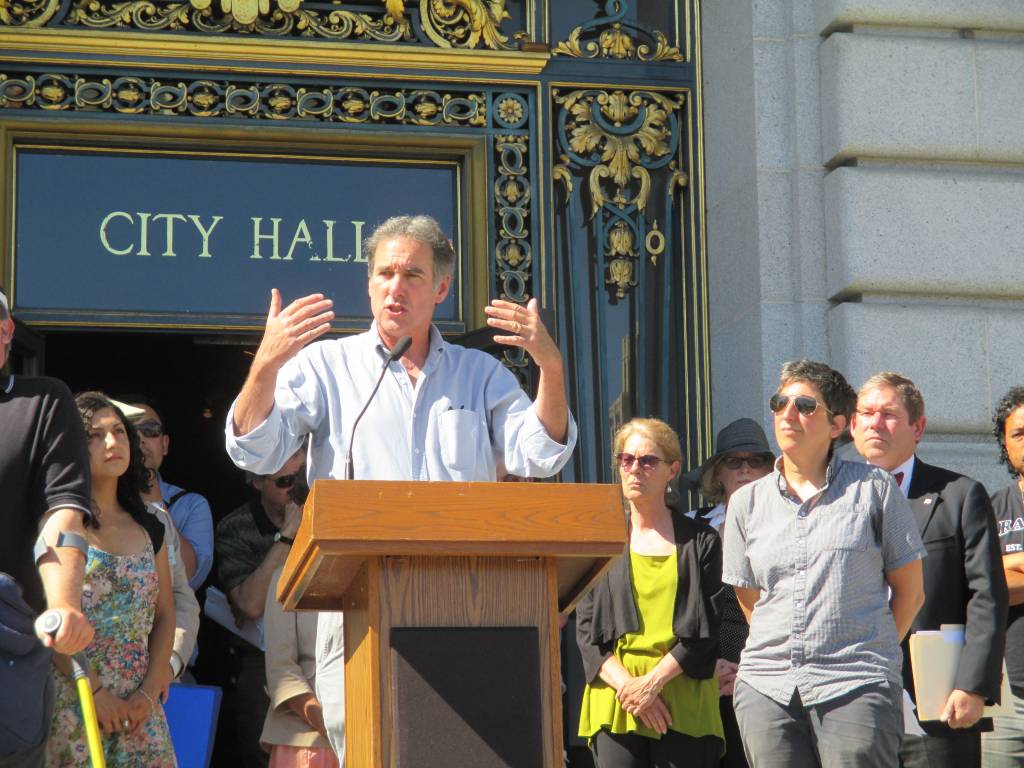
By Tim Redmond
OCTOBER 3, 2104 –Pretty amazing how many opponents David Chiu’s Airbnb legislation has drawn. At a noon press conference today, the landlords and the tenants, hotel workers and (fairly conservative) neighborhood groups, joined together to make the case that his bill is deeply flawed and shouldn’t pass in its current form.
There were amazing moments. Consider this, quote, verbatim “We can’t allow our valuable rent-controlled housing stock to be decimated by people only looking to make a profit.”
You think that was someone from the Tenants Union? No – that was Janan New, the head of the San Francisco Apartment Association, a leading landlord group.

Chiu said when he presented his bill to the Land Use Committee a few weeks ago that he had met with all of the stakeholders, had hammered out a compromise that would address the need for regulation without eliminating the short-term rental business. Ted Gullicksen, director of the Tenants Union, was among those involved.
But he was on the podium today, saying that the bill would allow entire apartment buildings to be converted to Airbnb, that hundreds of tenants face eviction under this short-term rental crisis that is (as his often opponent, Janan News says) decimating that rent-controlled housing stock.
In fact, I’m not sure there’s anyone supporting the Chiu bill who isn’t making money from the hotelization of the neighborhoods.
The coalition is pushing for the supervisors to block the bill at this point, slow down the process, and do it right. But at the very least, members want three amendments – a private right of action to sue, a limit to 90 days a year for all short-term rentals (with the hosting platforms reporting the necessary data to the city), and the protection of all subsidized affordable housing stock.

Mike Casey, head of the hotel workers’ union, had another demand: Airbnb should pay its back taxes.
The city’s tax collector has ruled that the company – NOT the individual hosts, but the corporation that runs the platform – is liable for collecting and paying the city’s hotel tax. We’re talking about at least $27 million that has never been turned over to San Francisco. Now, Airbnb says it will pay in the future – but Chiu would legalize the short-term rental game without ever demanding a dime of the back taxes.
“This Board of Supervisors is actually considering not holding a $10 billion corporation accountable,” Casey said. “If this is the sharing economy, how about sharing the wealth of a big corporation?”
Doug Engmann, former planning commission chair, noted that the bill would rezone the entire city – and that when he was running the commission, even modest neighborhood rezonings took months and months. “This legislation should be voted down,” he said.
So we will see this week: Will the supervisors bow to our tech overlords, or listen to the tenants, the landlords, and a whole lot of homeowners who want this bill substantially changed or defeated?
A final thought: My old friend Laura Fraser, a writer who owns a small house in Mexico, posted a comment that I’m going to repost here, because it’s telling:
To Airbnb my Mexico house, I need to become a resident, get a work permit with permission to rent my house, register with Hacienda, the agency that controls housing, set up an account with them, hire an accountant who reports my rental income every other month, and pay taxes on that income. As a small business, my tax rate is lower than a hotel, but about 13%. Hacienda has people who go through VRBO and Airbnb and sees if they are registered and fines them if they are not, which is incentive for gringos like me to go through those steps and not just rent out my house to other gringos and pay no taxes whatsoever for the city services I use and the impact I make on the hotel and rental markets. I also pay for maternity leave as required for my housekeeper and other employee benefits. In other words, it’s a bit of a hassle but I’m getting a good deal in return, and if Mexico can manage to regulate Airbnb, you’d think San Francisco could, too.
Yep. You’d think.





